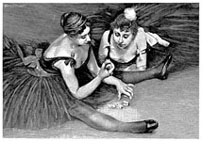
Home-Schooling & Sacramental Preparation
NAVIGATING UNCHARTED WATERS
To the dismay — and downright amazement — of the elitist “experts,” home-schooling has become a force to be reckoned with on the American educational landscape. Currently, there are an estimated 1.5 million school-age children who are home-schooled. This represents approximately three percent of all school-age children.
But that’s not all. The number of home-schooled children is growing on average from seven to 15 percent each year. Further, this educational option is being chosen by a broad cross section of Americans, from radical back-to-nature types to staunch Protestant fundamentalists, and everything in between. Regardless of one’s own views of home-schooling, it can no longer be dismissed as a passing fad or fringe movement.
In light of this dramatic growth, it is not surprising that many Catholic families now home-school their children. Perhaps a decade ago Catholic home-schooling was rare enough in most places that issues such as sacramental preparation could be worked out on a case-by-case basis on the parish level without the diocese or universal Church taking any notice. Now that home-schooling has arrived — or at least is arriving — as a discernable movement within the Catholic Church, many dioceses are taking notice and promulgating guidelines for recognizing and incorporating home-schooling within the life of the local Church.
Obviously, pastoral concern for the home-schooling families should impel Church leaders to seek ways of ensuring that their spiritual needs are met. There are, of course, other pragmatic reasons why the Church should take the issue seriously. Many of these home-schooled children would be prime candidates for the Catholic school system, which in many places is suffering from dwindling enrollment. Reputable studies indicate that home-schooled children achieve well beyond the national average academically. In addition, Catholic home-schoolers not only teach reading, writing, and arithmetic to their children, but also the Catholic faith — every day, within the home. These families generally consider faith development at least as important as academic achievement. From these families will likely come a significant percentage not only of Harvard and Yale graduates, but also tomorrow’s priests, religious, and lay leaders.
You May Also Enjoy
Good guidelines affirm home-schooling as a legitimate response by parents to their role as primary educators, while also affirming that home-schoolers should be part of the local Church.
Many believe the problem with homeschooling is the socialization of children. One couple, however, believes they have the answer.
My family lowered our small boat into the water and are rowing away from an American educational establishment that feels like the Titanic.

